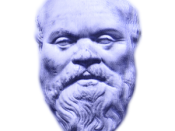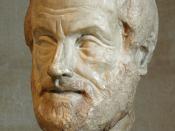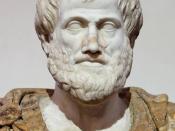The main credited "father of logic" is widely considered to be the ancient Greek philosopher Aristotle. Interested in every area of human knowledge about the world, Aristotle aimed to unify all of them in a coherent system of thought by developing a common methodology that would serve equally well as the procedure for learning about any discipline.(Hurley 5)
For Aristotle, then, logic is the instrument (the "organon") by means of which we come to know anything. He proposed as formal rules for correct reasoning the basic principles of the categorical logic that was universally accepted by Western philosophers until the nineteenth century. This system of thought regards assertions of the subject-predicate form as the primary expressions of truth, in which features or properties are shown to inhere in individual substances. In every discipline of human knowledge,then, we seek to establish the things of some sort have features of a certain kind.
Aristotle further supposed that this logical scheme accurately represents the true nature of reality. Thought, language, and reality are all alike in form, so careful consideration of what we say can help us to understand the way things really are. Beginning with simple descriptions of particular things, we can eventually assemble our information in order to achieve a comprehensive view of the world.(2)
The initial book in Aristotle's collected logical works is the Categories. It begins with a distinction among three ways in which the meaning of different uses of a predicate may be related to each other: homonymy, synonymy, and paronymy.
Another of Aristotle's logical works, On Interpretation, considers the use of predicates in combination with subjects to form propositions or assertions, each of which is either true or false. We usually determine the truth of a proposition by reference to our experience of...


